#so many content warnings
Text
It is not recommended to listen to this weeks episode while eating.
695 notes
·
View notes
Text







Chicago Holiday (Part 2)- Time Stamp Roulette
Minutes: 9 15 23 28 29 35 41
#cw: flashing lights#cw: knife#cw: gun#so many content warnings#ALSO I love that they cheer when they show back up at the bar#due south#duesouthedit#portland gifs
14 notes
·
View notes
Text
I like critiquing romance novels, and this one takes the cake because it's so TERRIBLE. I also exclusively used gifs from The Room, which made everything better. It's a dark romance novel, so take note of the CWs.
2 notes
·
View notes
Text
Me: "I wonder what the fuck is wrong with Ohkubo that he wasted those chapters about Tamaki's purpose to the story. And what was the deal with Yoshida? Actually, did they ever give her a full name, or is it just 'Yoshida'? Maybe there's some secret meaning behind the name 'Yoshida'--let me check online--"
Wikipedia: "...Well, about that. In our list of fictional characters with that name--"
Me: *reads* "... ... ...Oh, God, _that's_ what he is referencing?!"
0 notes
Text
so this is what ive been working on since the first half of the jy finale. high 5 heroes/rat grinders/kipperlilly animatic.
CW: Violence against minors, death of minors, blood, animal cruelty, incineration
Spoilers for all three seasons of fantasy high!!!
You can also watch it here on YouTube
anyway ive been slowly losing my mind over this for the past few weeks. i hope you all lose your minds too.
#dimension 20#fantasy high junior year#fhjy spoilers#the rat grinders#kipperlilly copperkettle#d20 spoilers#mind the content warnings#so many teenagers get beat up in this
431 notes
·
View notes
Text
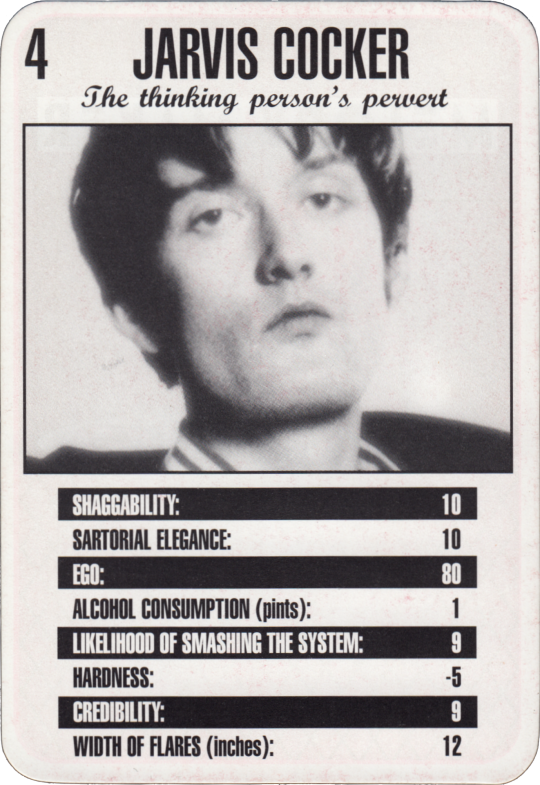

jarvis cocker (pulp) trading card from melody maker magazine (1995)
scanned from my personal collection ^^
#i’m about to graduate and i am so insanely stressed out. so many projects. so many presentations. woooh baby. i am going to explode#anyways my mom bought me this card as a surprise treat a little bit ago and i wanted to scan it :] hope none of you mind lol#melody maker#pulp#pulp band#jarvis cocker#1990s#britpop stuff#my scans#suggestive content warning#suggestive cw#(it's only text but just to be safe..)
264 notes
·
View notes
Text
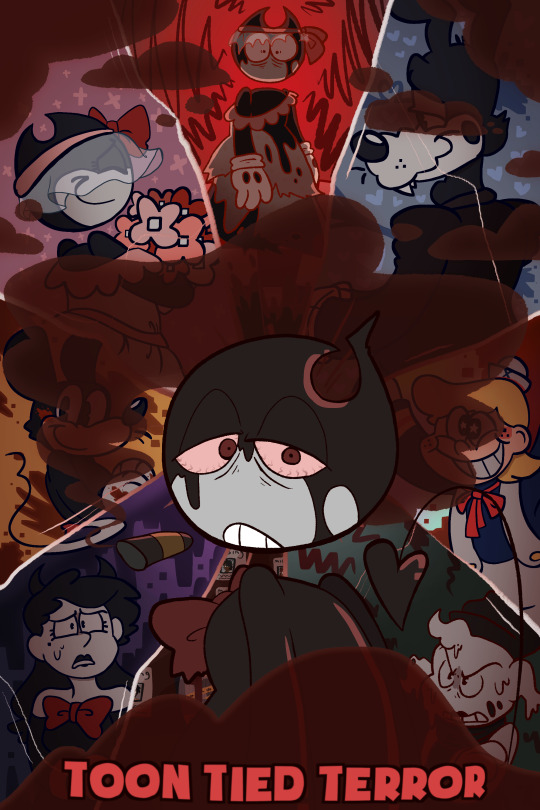
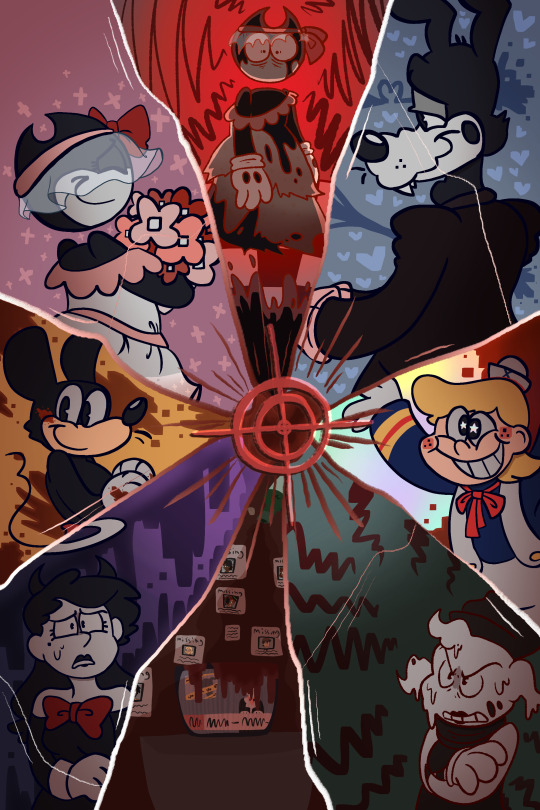
Me and my partner @the-good-ol-art-corner collaborated on this AWESOME poster for one of our favorite Bendy Aus @toontiedterror by @dictatortirah !! I am in LOVE with how it came out and I am so excited to see how this story and world develops!!
I put so many details into this, it is absolutely silly, but I had a swell time doing them. Those headshots on the missing posters belong to the staff from our own Bendy project @howdy-folks-its-showtime and we didn't even intend to make two versions. But I put so much into the background... I just had to make a version without the foreground to show it off <3
#batim#batdr#bendy and the dark revival#bendy and the ink machine#bendy#bendy the dancing demon#bendy au#batim bendy#bendy the demon#borendy#mickey mouse#batdr carley#alice angel#shipahoy dudley#boris the wolf#cw drinking#cw alcohol#cw alcoholism#cw cartoon blood#cw cartoon violence#cw smoking#cw implied gun violence#cw gun violence#slight eyestrain#theres a lot of content warnings this story is intense but I love it for that tbh-#but yeah approach with caution KJDHFSGKJDHFKGJHSD#also u guys would not believe how many layers I made for this bad boy#by the end clip paint studio was lagging just opening it but I have no regrets#it turned out so so cool one of my favorite bits of art Ive ever had the pleasure of helping create <3
378 notes
·
View notes
Text
18+only: bondage, begging, humiliation, dom/sub subtext
Just thinking about Eddie messing around with the handcuffs and thinking about what it would be like to be restrained against a headboard since he didn't have one.
Going to your house and using the spare key you have hidden to get inside. You would never know! He'd be in and out. Going to your room and laying on your bed stretching his arms above his head and interlocking the handcuffs with the headboard. Tightening the cuffs so they aren't too tight but they also leave a thin red mark if he struggles against them too much. Not enough to cut him but enough he can see it later and be reminded that he was here like this.
And Eddie is so turned on and he's in your bed and surrounded by your scent he can close his eyes and imagine you laying next to him. He goes to unlock the handcuffs but the angle is weird and he drops the key. He can hear it hit the floor with a clang. Eddie tries to get out but can't. And Eddie's face is flushed from embarrassment and now really isn't the time to learn that makes him a bit harder. All he can do is wait and try his best to not think sexy thoughts and hope his problem goes down.
And then you come in and all you see is Eddie laying on your bed, arms stretched above him. The glint of metal wrapped around his wrists and your headboard like a flashing light. Eddie's face is flushed, a nice red that spreads down his neck. With his arms stretched above his head, his shirt has lifted revealing his stomach. Curls of hair that form under his belly button that trails down and disappears under his jeans. A very prominent bulge in his pants. A very very prominent bulge.
Eddie is simultaneously mortified and horny and he can't help shivering under your gaze. He is literally at your mercy here and if that doesn't make his dick strain harder against his jeans.
And if you come over and slowly trace your fingers up and down his chest, each stroke down getting closer and closer to his jeans. Him lifting his hips up slightly in the hopes that he can get some friction from your hand against him. You scolding him and removing your hand, teasing him. Eddie's whimpers and gasps filling the air, begging you for anything just please touch him. Finally getting some relief when you finally do
#Mentally I am here and God i wish I was physically#I should be writing instead have this#I am adding as many content warnings to the top as possible so that way nothing is missed okay anyways pls enjoy#Eddie Munson x reader#Eddie Munson x you#Eddie Munson x y/n#Eddie Munson/you#Eddie Munson/reader#Jade is Talking#Eddie Munson smut
247 notes
·
View notes
Text
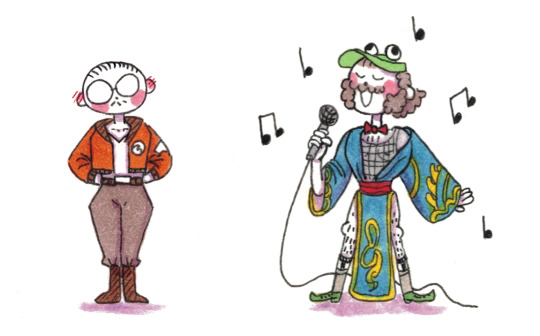
Detectives at the Disco (Elysium)
#disco elysium#kim kitsuragi#harry du bois#“Hail holy queen of the sea -- You're whirling in rags -- You're vast and you're sad.”#I have been taken back by the disco fever and I wanted to draw these guys now that I can...y'know...draw.#I owe a lot to DE honestly.#If it were not for yagrandmapeach's daily disco elysium comics this blog would have never existed.#The idea that I could do lighthearted daily doodles made art feel possible and approachable. That fun was most important!#I was so inspired by their fun style and goofs! I loved the pen on paper look and their stylizations!#I'm still really inspired by them to this day! Peach if you're out there (unlikely)...Thank you for all the art you have shared.#To those who are considering giving DE a try: please be aware of it's many content warnings.#It is dark but also so extremely full of hope and love!!!#it's a murder mystery where you think you're supposed to be finding the culprit but you end up finding....yourself.#Also it has Kim Kitsuragi. The best companion you will ever have in a video game.#And it lets you dress up a stinky old man in whatever clothes he finds lying around. It's great.
601 notes
·
View notes
Text

#cinno drawings#fanart#content warning#content warning game#streamer#content warning streamer#ewan conan#kill streamer#SO MANY TAGS AGAIN
70 notes
·
View notes
Text
The "movie about a movie that kills you" is a surprisingly robust genre of horror. There's a wide range of approaches, but one key factor is the question of how good the deadly film in a film is, on its own. Some approaches are keeping the faux film entirely unseen, use brief clips, or make it real short.

Antrum: The Deadliest Film Ever Made goes in for a high risk approach and delivers a complete finished film, ostensibly made in the 70s and never released, framed by brief opening and closing info bites to set the stage of it.
Somehow this thing was completely off my radar, which means I was taken fully off guard as an ominous warning about the content in white text on black appeared on screen, giving a thirty second count down to leave if I wanted.
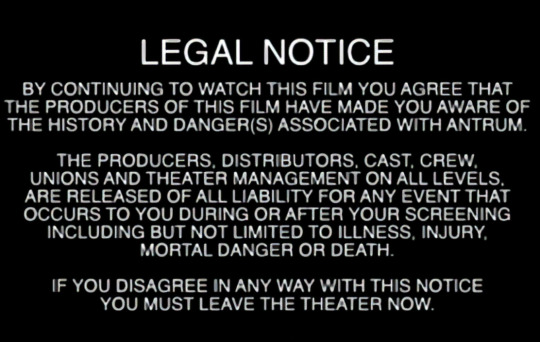
Wonderful showmanship and canny filmmaking that got me right in the mood to enjoy what followed. While I wouldn't call it a scary movie, I found it almost delightful in the atmospheric dread and devotion to its aesthetic of low budget 70s films. Nothing in it feels like a curse on its own, but it does feel like the sort of movie that could easily prompt psychological distress for anyone under psychotropic influences, pre-existing emotional vulnerability, or prone to delusional states. Not through anything supernatural, more because it works hard to keep the viewer in constant doubt over what is and is not real for the characters in the film. Combined with the framing device of it being a movie somehow able to influence the real world of the viewer, and the use of fractionally visible flashes of occult symbols on the screen, it generates an intense feeling of unreality which for me was an almost drug-like high and an immersive pleasure.
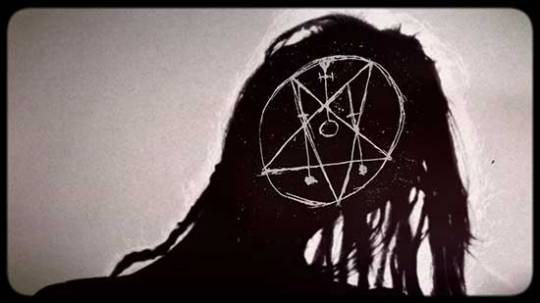
The premise of Antrum is simply a brother and sister decide to dig a hole to hell, and the movie plays out around this event by surrounding it with disturbing sounds and imagery, as well as real world dangers that weave the protagonists between the supernatural and mundane while keeping them in a state of terror and madness that grows until it becomes unrelenting.

In a certain sense it also feels cursed, like the kind of film where there are elements that feel very transgressive - in particular the opening scene which to my mind evoked Un Chien Andalou - not the infamous eyeball slicing scene, but the use of rotting animals. The few and very basic visual effects remind me as well of the early Survival Research Laboratory devices engineered by Mark Pauline.

However, the core question for me is also always what is the movie about besides the plot. If I had to identify some rough themes, I would say it's trying to explore the idea of understanding death and violence through the eyes of children who do not yet have the psychological tools for processing such matters, but who have been left on their own to do so regardless.
Many of the unusual elements in the movie can relate to death rituals poorly understood, starting from the very premise of digging a hole into the earth. And the same act is surrounded by strange rituals unclear in their origin, ideas which might be logical drawn from watching words recited over a grave without having a connection of purpose. Their encounters with other people are fully without possibility of communication as none of them speak the same language, and these mundane threats feel at times akin to a satanic Alice in Wonderland, rituals and violence whose meaning cannot be understood by the protagonists.
Likewise the supernatural is full of unprocessed images of death. Demons with black skin who look like mummified corpses. River crossings and empty chains dragging through leaves. It's as if death itself has manifested through the ambient world, surrounding the two children and refusing to let them leave its circle.
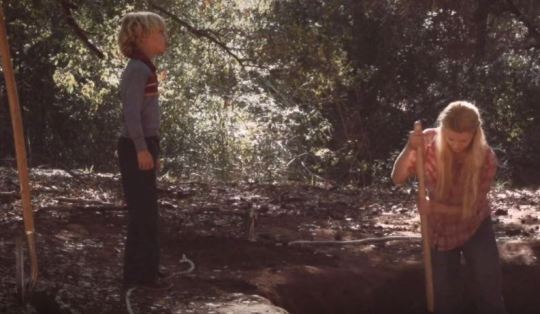
In combination with the intriguing use of sigils inscribed throughout, it creates a movie that is for me a joy to watch. An absolutely perfect Halloween spook for next year, but your mileage may vary between finding it full of pretentious nonsense or maybe the scariest film you'll ever watch. It can really come off either way, and I'm honestly not quite sure why my reaction was actual joy in the watching. Not to undercut the severity of the subject matter, but I just can't stop thinking about how happy I was to watch the movie at work mechanically, to enjoy the well oiled pieces fitting together, and then all topped off with the delicious extra treat of the framing device. Surely worth 90 minutes of your life.
#antrum#unreality#definitely big content warnings about animal death and injury#also children in danger and possible child deaths#not many jump scares though if any#also tbh i genuinely think it has the potential to bring on a delusion because it is very committed to the bit#there's no part where its like haha jk this isn't a real documentary about a movie its all fake#the framing device is used to wrap everything up in a way that never breaks the immersion#so if you're in a really suggestive state there's a nonzero chance you may believe the movie is going to kill you for real
477 notes
·
View notes
Text

imperfection
#valentino#hazbin hotel#anyways val is fucked in the head i think and engages in many fucked up self destructive behaviors. as a treat to me :>#not tagging this with a content warning on purpose which ill spare the reasoning unless asked so i dont have a whole ramble in the tags lma#rot posts#rots art
27 notes
·
View notes
Note
So uh, you know what DoL is, that game is bat shit but fun if you ignore certain aspects ... Its got some nuts lore and everyday activities, like image Yuu saying something like "oh this place is pretty nice, I haven't been kidnapped or almost kidnapped and nothing too crazy happened!" Extra wtf points if Yuu had TF traits (maybe devine and animal for extra fuckery) like oh they aren't a beastman they just ate a bunch of weird shrooms wore a sick ass choker and prayed for 50+ days (Wolf + Angel TF)
I mean yes, there's some parts I'm glad you can toggle off cause holy fuck. Then again the creator said that it is a trauma simulator and the whole point of the game is that it never gets better but you can cope which is one of my fav tropes in horror. Like fear and hunger in that regard (I think abt these games a lot tbh).
Tagging this as Dark Content just in case
The lore is so fucking intense and the fact there's a potential timeloop/eldritch being trapping everyone there and influencing them is fucking WILD. The whole world is a cage designed for you and it lets you know it.
Anyways. I can imagine that Yuu comes with a lot of trauma that needs to be worked out but they are one hell of a fighter... and I imagine Crewel is the one to break the horrible teacher curse and help them heal cause he's nice. Other students think you're insane for considering him kind. They also wonder why you put up with Crowley but he is an improvement from your previous headmaster.
Students getting their asses whooped in cause Yuu had to always fight for their life and shit.
So much "this is how it should have been" or "I wish I could have met you as a better person and loved you right away but I wouldn't have been able to love you as much as I do now cause you've been by my side"
Yuu panicking over the kids at the orphanage cause they're used to looking out for them. Bonus if maybe Deuce or Ace gets in trouble and Yuu takes the blame prepared for the most heinous punishment but instead just gets some boring homework to do and it kinda breaks them.
They share horrible stories that are relatable in their world and everyone just stops.
Also the transformation things in the game imply that Yuu to an extent is a shapeshifter that changes gradually. Can you imagine if a few months into the shool year Yuu gets Fae ears, maybe some animal like claws and sharp teeth, or even gills and they're like "yeah I can do that" or maybe they even fall in love with one of the non human boys and they start changing to be more like them cause they love them <33
This game ruined me
#it really is a mix of do anythibg and fuck around and find out#me becoming an angel wolf hybrid hut then i chabge to an angel cow cause i was kidnapped and forced to eat grass#i also have many lovers and one of them regularly kidnaps me and the others are all abusers excelt for 3#ans they can also be a lil funky#and one of those lovers is too old for you but theyre in cahoots with very powerful and evil people so you have to play along#anotehr one puts u in a dogcage and ur their housespouse too#also an eldricth being is stalking you#you also have to raise ur parasite babies#and your usedibg to being human furbiture#its so fucked uo but BRO#anyways yeah if you play it heed the fucking warnings causevits so much worse but its cusomizable#not writing#not requests#i was devatibg writing for it on anogher blog but idk man...#dark content#just in case#DoL mention
28 notes
·
View notes
Text
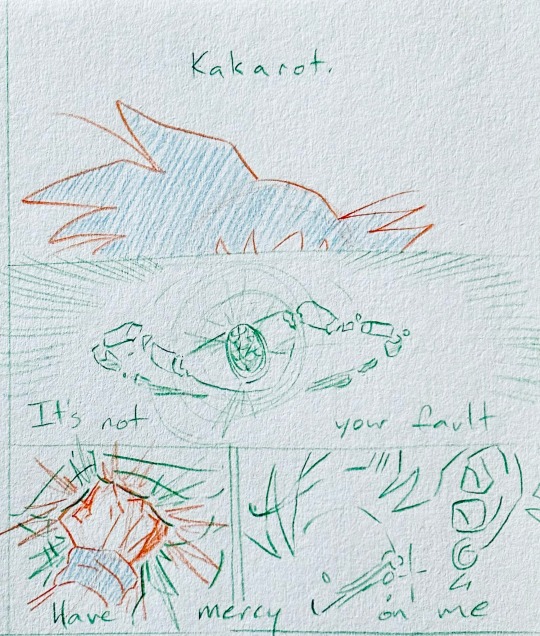
Have Mercy On Me // Finally, Peace
Z Broly Angst doodle fan comic whatever
Ramble ( TW // Ideation headcanon )
Had the devastating realization/headcanon that maybe Z Broly saw fighting Goku as his only way out of the hellish suffering he was being put through by his own father all his life. There was no rivalry. Death was his only escape. Broly likely knew that he’d end up killing himself by letting loose all his power at once, or that Goku could at least be the catalyst for it.
Maybe Broly wasn’t even fully trying to destroy the Z Fighters, but just making it a good show for his father to give him the impression of doing his bidding—until Paragus ran. Abandoned him, after everything.
And then Broly didn’t care anymore. His efforts, wasted; every day he has ever been alive. His freedom after crushing Paragus wasn’t worth sticking around for anymore, given that the Z Fighters and everyone else would already consider him a threat in need of being put down for good, anyways. A freak. The devil himself. Nobody would ever even try to save him, like he once did for another, even as a baby.
Broly was screaming for mercy when he called for Kakarot, challenged him to fight, threatened to take away everything Goku loved. Of course the Z Fighters were in mortal danger, BUT, they were still in good enough condition that a senzu bean could heal them. That just… Sticks out to me. Broly easily could have one-shot TPK’d every single one of them once he went LSSJ.
He just wanted to escape.
(Of course I’m reading way too far into it all lol BUT this character speaks to me personally somehow. Broly’s tragedy of a story tears at my heartstrings like no other character before him the more I delve into what his character can be and mean. His story is a powerful warning and a heartfelt comfort, a devastating mirror.)
#artbybai#dragon ball#dbz#dbz broly#broly the legendary super saiyan#fan art#fan comic#rambles#triggering content#trigger warning#tw death#tw ideation#look#im doing ok#dont worry about me#but i love analyzing angst and tragedy and themes like this#angst#tragedy#broly is like my comfort character for heavy topics like this#cathartic almost yknow#i sympathize AND empathize#my heart bleeds for him#on so many levels#all the feels
25 notes
·
View notes
Text
Bro, bro, bro hear me out, I can fix her

#slay the princess#unsurprisingly the razor is my new favorite princess#she’s a complete menace and I love her so much#tw blood#tw body horror#tw gore#she has so many content warnings ❤️#“I can fix her” but I’m the one who gets worse
240 notes
·
View notes
Text
A hypothetical look at the childhoods of Carlo and Romeo
Despite Carlo and Romeo being two of the most central characters of Lies of P, what we know about their backstory is next to marginal. We know that the two of them went to school together and were best friends (perhaps even more than that), but their time in Monad Charity House is only presented in snippets and fragmented memories, and despite being highly significant, their characters remain elusive - like shadows cast over the entirety of the story, always present, never tangible.
Thus, many have filled the gaps left in their characterization with their own imagination. As for myself, I was curious what their early lives might have been like, before they met at Monad Charity House - and since it was the closest thing to the game's setting I could find, I did some research on Victorian children and their upbringing.
What I found out, however, left me absolutely shocked and made me keenly aware of just how awful Carlo and Romeo's childhood must have been, going by historic standards. As pretty much everything during the Victorian Era, a child's upbringing was very dependent on social class - however, no matter if you grew up in a rich or poor family, each came with its own kind of suffering, and regarding the question of "What were Carlo and Romeo's lives like before Monad Charity House?", the brief answer would be: "Probably not great."
As for the long answer... I should mention this is my own interpretation of Carlo and Romeo's backgrounds, and none of this is officially confirmed. However, given what we know about the two's origins, I consider it quite plausible, and what we can conclude from it might not only give us better insight into their personalities, but also some of the real-life background behind the original fairy tale of Pinocchio.
Just as a fair warning, though: This is about to get a little depressing.
[Spoilers for Lies of P!]
[CW: mentions of very questionable parenting methods, depression, suicidal ideation, poverty, parent death, child labor, abuse and exploitation of children]
Carlo
For this analysis, I'm going to assume that Carlo was born into a fairly well-off household. (The description of Carlo's portrait calls him "an aristocratic boy", and since Geppetto is the mastermind behind Krat's puppet technology, I assume he'd have his fair share of the profits.)
By the standard of their time, upper-class children were quite spoiled: Unlike their working-class peers, they never had to worry about who was going to provide food for them, and the horrors of child labor were never of any concern to them. You would think that being born into a rich family doesn't leave you a single thing to wish for - you'd have nice toys, fine clothes... and well, everything, except for parental affection.
For the most part of the day, upper-class children wouldn't even see their parents - they were only summoned to appear before them at a set hour of the day, and during these occasions, they had to address their fathers as "sir". Essentially, meeting your parents was more like an audience with a stranger, a rare privilege strictly regulated by formality. Children were expected to act prim and proper, only allowed to speak when spoken to, and thus unable to express their true feelings, thoughts, or opinions. Any show of affection was extremely rare - Winston Churchill (1874 - 1945) once remarked that he could "count the times he had been hugged by his mother" as a child.
The parents were more or less completely absent from their children's lives, and when there actually was interaction between them, the children were expected to unconditionally obey their parents. Osbert Sitwell (1892 - 1969) once commented: "Parents were aware that the child would be a nuisance and a whole bevy of servants, in addition to the complex guardianship of nursery and school rooms was necessary not so much to aid the infant as to screen him from his father or mother, except on some occasions as he could be used by them as adjuncts, toys or decorations." (Can you imagine? Geppetto taking Carlo to some big social event to show off his "perfect little son", and Carlo just standing there and silently enduring the ordeal, looking at his father all the while and wondering "Did he ever realize I'm not one of his puppets?")
So, by the standard of the time period Lies of P is set in, Geppetto neglecting his son isn't even anything terribly unusual - in fact, that's perfectly normal Victorian upper-class parent behavior.
Since they didn't take care of their children themselves, upper-class parents would hire a nanny to raise them. Nannies would be instructed what kind of behavior and morals the parents wanted instilled into their child, and they would be responsible for their education as well as teaching them manners, propriety, how to dress and so on. As such, the nanny effectively acted as a substitute for the parents - and given that maid puppets exist and Geppetto probably wouldn't let any strangers near Carlo, Carlo's nanny was most likely a puppet as well.
The daily life of upper-class children was based on strict routine - some like to say it operated with "clockwork regularity". Breakfast would be served at 8 o'clock in the morning, dinner at 12 o'clock, and tea at 6 o'clock.* Children would very seldom leave their room, except to take short walks in the park with their nanny. Education would mostly be given at home by a tutor, which included basic lessons like reading, writing, and arithmetic, but also "socially appropriate skills" like dancing and playing the piano. (Since we see a puppet giving piano lessons to a child in the intro, chances are Carlo's tutors were also puppets.)
*Eating times varied throughout the Victorian Era; a "dinner" might also be a meal eaten during midday.
The rest of the time, children would have nothing to do but to play with their toys (except on Sundays, which was forbidden). Rich families had the luxury of being able to afford the most elaborate of toys, such as automated dolls, clockwork trains, and jack-in-the-boxes, which were extremely popular among children. In fact, since clockmakers were also the ones to build toys, I could imagine Geppetto actually made the toys for Carlo himself. (However, I feel like this only would have made Carlo loathe them; in his eyes, it would've been proof that "father pays more attention to the toys he makes for me than actually looking at me".)
In short, the life of Victorian upper-class children was lonely, depressing, and stuffy to the point of suffocating. Given these circumstances, I would actually be surprised if this didn't leave mental scars on Carlo. It has been documented that a lack of parental affection causes psychological issues lasting all the way into adulthood, such as low self-esteem, trust issues, anxiety, difficulty with social relationships, and lack of emotional control. Also, considering Carlo was probably surrounded by puppet servants all day, he wouldn't even have had a single human being to interact with most of the time - something which most likely had a detrimental effect on his psyche.
Given this dreary existence, it would make absolute sense for Carlo to look nothing short of depressed in every depiction we see of him. The feeling of emptiness when being pressed into the corset of others' expectations is actually something I'm well acquainted with - it feels like walking beside yourself, like your body moving while actually feeling dead inside. A bit like a puppet on strings, if you will. With his life being a monotonous routine controlled by someone else, it wouldn't be surprising if Carlo had difficulty still seeing a purpose in it. (There have been some theories going around that Carlo committed suicide; at the very least, I think it's highly likely he had suicidal ideations during his youth.)
Perhaps this is where Pinocchio - the character from the fairy tale - might have become something like an identification figure for Carlo. Pinocchio was a puppet, but instead of doing what his creator intended - what his father expected - he did whatever he wanted. I'm sure Geppetto gave him the book as a measure to educate him, but it ended up having the opposite effect. In fact, it might have been what first taught him the concept of freedom: Geppetto's puppets only ever did what he told them to, executing the exact actions he had programmed them with, over and over again - but Pinocchio showed Carlo that it didn't have to be this way. (I've seen a lot of interpretations of Carlo disliking puppets, and while I can see where this is coming from, I don't think this is because Carlo disliked puppets in general. Rather, I think he saw them as "extended arms" of his father and a symbol of his need to control everything around him; otherwise, it would be a little strange for Carlo to be attached to the story of Pinocchio so much.)
However, I think beneath all the pent-up frustration and hatred, there was also the wish for his father to love and appreciate him. At the end of the book, Pinocchio returns to his father after all the hardships he had to go through, and the two reconcile and live happily ever after. Since Pinocchio's father goes looking for him when he disappears, perhaps Carlo believed that if he rebelled against him and put himself in danger, Geppetto would realize that he actually cared for him.
So, if Carlo was very prone to temper tantrums and acting defiantly towards his father, it might have been on one hand to show that he didn't want to be part of Geppetto's perfect stage play anymore, and on the other because he was vying for his attention. Due to his upbringing, however, Carlo wasn't really able to communicate his feelings in a proper way. (I like to imagine Carlo as a very emotional person, but having difficulty to actually express his feelings.)
Geppetto, however, wouldn't have the sensitivity to understand this - he most likely would've tried to rectify his son's "mischievous behavior" by disciplining, as was typical for the time period (in general, it was believed that you had to "beat the evil out of children" for them to become a good person). Of course, that wouldn't have made things better - in fact, I wonder if part of the reason Geppetto sent Carlo to Monad Charity House was that he was just at a loss what to do with the boy. Since all of his educational measures were fruitless, perhaps he thought that sending him to the boarding school would finally put Carlo on the right track - although the result of that probably was also quite different from what Geppetto expected.
Romeo
Meanwhile, poor Victorian children had to live in a completely different, brutal reality - for them, day-to-day life was a literal struggle to stay alive.
We know that Romeo was an orphan, and according to Eugénie, that's not much of a rarity in Krat. Indeed, street children existed in abundance during Victorian times: It wasn't uncommon for working-class children to lose one or both parents - due to unsanitary conditions in Victorian slums, many people died of disease, and given the hazardous working conditions in factories and coal mines, accidents were commonplace. However, the term of a Victorian orphan was actually a little broader than that, also extending to children who ran away from home due to hailing from alcoholic and neglectful families. Often, mothers who were single or had a child out of wedlock would also simply abandon their children. Whatever the reason for their situation, these children were forced to fend for themselves at a very young age.
In the Trinity Sanctum in Krat Central Station, there's a note mentioning a "pickpocket who was overconfident in a gamble" and "had his heart stolen and died". Since Romeo made "a deal with the devil" (the "devil" presumably being Geppetto who turned him into a puppet), people have interpreted this as referring to Romeo. Turing to crime to support themselves was not a rarity among poor Victorian children - in fact, half of the defendants tried at the Central Criminal Court of England and Wales between 1830 and 1860 were aged 20 or younger. There were even organized gangs of child thieves who were trained in pickpocketing by a "captain", similar to those from Charles Dickens' novel Oliver Twist. (However, the items that were stolen most often were actually not purses or pocket watches, but handkerchiefs; silk handkerchiefs had a pretty high resale value, and the thieves would take them from pockets, rip out the initials, and resell them for a good price.)
We can't be sure whether Romeo teamed up with a few other kids or not, but personally, I'd wager he did - it would be much safer to operate in a group in case one of them gets in trouble, and overall, Romeo's personality seems a bit too caring for a lone wolf. (As the King of Puppets, he was not only determined to save as many humans as possible, but also possessed the unconditional trust and loyalty of the other puppets. To me, this means he most likely cared about them, and they cared about him in return - if it was just programming, the puppets probably wouldn't be lamenting his loss after he dies. Compare this to Geppetto, who has to use force and coercion for others to obey him.)
Also, since the notes in the Trinity Sanctums always seem to have a connection to the place where they're located (factory worker -> factory; cleric -> cathedral; "greatest singer"/Adelina -> opera house), that would mean the train station was most likely Romeo's base of operations.* (Train stations tend to be very popular among thieves, since it's easier to pick pockets in the confusion of people boarding or getting off trains.) This would imply that Romeo didn't grow up in Monad Charity House since he was an infant, but arrived there at a later point during his childhood.
*EDIT: I just had a thought that the note in the Trinity Sanctum could also mean the train station is the place where Romeo died. (All the other notes are connected to murder or some other violent action, and since we can assume they were written by Arlecchino, he was probably more interested in that.) Since Geppetto has his secret workshop wagon in Krat Central Station, maybe the place where he built P is the same where he built Romeo.
Since there were so many orphaned children, the few orphanages that existed couldn't receive all of them. Instead, workhouses were established as institutions for all kinds of destitute people - including orphans - who were unable to support themselves and were given lodging and food in exchange for labor. However, many children actually preferred living on the streets, rather turning to crime than going to the workhouse. At a first glance, this may seem a bit unreasonable - surely, not having to run around in worn-down rags and steal your food just to survive would at least be an improvement?
Well... Turns out, not really. The conditions in Victorian workhouses were notoriously awful - they were overcrowded, unsanitary, and cruel places to live. Daily routine was strictly regimented, consisting of 9–10 hours of repetitive and physically demanding labor and very little free time. What little food there was was of poor quality, privacy was basically nonexistent, and the dozens of inmates sleeping together in dormitories often had to share their beds - children usually had to sleep up to four in a bed. The consequences for refusal of work or any kind of rule violation were beatings, deprivation of food, being locked up in solitary confinement in a dark cell, and other draconian punishments.
If this doesn't sound like a very hospitable atmosphere, that's because that was the exact intention behind it. Workhouses weren't meant to support poor people - they were supposed to scare them into finding work and make a living for themselves. Victorians viewed poverty as a self-imposed misery, and if you were a pauper, that was because you were lazy, retarded, or made bad choices in life. That's why beggars, vagrants, orphans, criminals, and mentally ill people were all indiscriminately housed in workhouses, because from the Victorian point of view, they all belonged to the same category of people: A stain that had to be removed from the public eye, either by forcing them to support themselves or by making use of their work force once they had donned the workhouse uniform. They were a nuisance to society, and their treatment in the workhouse was sure to make them feel that.
One of the worst fates for workhouse children, however, was to be hired out as pauper apprentices: Usually from 10-13 years of age, but sometimes as young as eight or seven, workhouses would send pauper children to factories in the countryside for an "apprenticeship". This "apprenticeship" involved factory owners buying children from orphanages and workhouses and making them sign a contract that lasted until they were 21 years of age, dictating that the apprentices had to be provided with food and accommodation, and in exchange, the factory owner was free to make use of their working power.
So in summary, workhouse orphans were essentially sold into slavery. This was all that much easier to do with children who had no parents and no other means to support themselves, and thus were free to be exploited by their employers. Some of the recollections from these former pauper apprentices are just utterly horrific - and in this case, I think it's appropriate to let the victims speak for themselves.
John Birley, who lost his father when he was two, lived in the Bethnal Green Workhouse for a time after his mother died of illness when he was around six. He was sent to Litton Mill as a pauper apprentice, and he had this to say about his experiences in an interview with The Ashton Chronicle in 1849 (source):
The same year my mother died, I being between six and seven years of age, there came a man looking for a number of parish apprentices. We were all ordered to come into the board room, about forty of us. There were, I dare say, about twenty gentlemen seated at a table, with pens and paper before them. Our names were called out one by one. We were all standing before them in a row. My name was called and I stepped out in the middle of the room. They said, "Well John, you are a fine lad, would you like to go into the country?" I said "Yes sir".
We had often talked over amongst ourselves how we should like to be taken into the country, Mr. Nicholls the old master, used to tell us what fine sport we should have amongst the hills, what time we should have for play and pleasure. He said we should have plenty of roast beef and get plenty of money, and come back gentlemen to see our friends.
The committee picked out about twenty of us, all boys. In a day or two after this, two coaches came up to the workhouse door. We were got ready. They gave us a shilling piece to take our attention, and we set off. I can remember a crowd of women standing by the coaches, at the workhouse door, crying "shame on them, to send poor little children away from home in that fashion." Some of them were weeping. I heard one say, "I would run away if I was them." They drove us to the Paddington Canal, where there was a boat provided to take us.
We got to Buxton at four o'clock on Saturday afternoon. A covered cart was waiting for us there. We all got in, and drove off to the apprentice house at Litton Mill, about six miles from Buxton. The cart stopped, and we marched up to the house, where we saw the master, who came to examine us and gave orders where we were put. [...]
Our regular time was from five in the morning till nine or ten at night; and on Saturday, till eleven, and often twelve o'clock at night, and then we were sent to clean the machinery on the Sunday. No time was allowed for breakfast and no sitting for dinner and no time for tea. We went to the mill at five o'clock and worked till about eight or nine when they brought us our breakfast, [...]
We then worked till nine or ten at night when the water-wheel stopped. We stopped working, and went to the apprentice house, about three hundred yards from the mill. It was a large stone house, surrounded by a wall, two to three yards high, with one door, which was kept locked. It was capable of lodging about one hundred and fifty apprentices. Supper was the same as breakfast - onion porridge and dry oatcake. We all ate in the same room and all went up a common staircase to our bed-chamber; all the boys slept in one chamber, all the girls in another. We slept three in one bed. [...]
Mr. Needham, the master, had five sons: Frank, Charles, Samuel, Robert and John. The sons and a man named Swann, the overlooker, used to go up and down the mill with hazzle sticks. Frank once beat me till he frightened himself. He thought he had killed me. He had struck me on the temples and knocked me dateless. He once knocked me down and threatened me with a stick. To save my head I raised my arm, which he then hit with all his might. My elbow was broken. I bear the marks, and suffer pain from it to this day, and always shall as long as I live.
I was determined to let the gentleman of the Bethnal Green parish know the treatment we had, and I wrote a letter with John Oats and put it into the Tydeswell Post Office. It was broken open and given to old Needham. He beat us with a knob-stick till we could scarcely crawl. Sometime after this three gentlemen came down from London. But before we were examined we were washed and cleaned up and ordered to tell them we liked working at the mill and were well treated. Needham and his sons were in the room at the time. They asked us questions about our treatment, which we answered as we had been told, not daring to do any other, knowing what would happen if we told them the truth."
In case there were any surviving family members, the children were sometimes deported without their knowledge. In 1849, Sarah Carpenter related the story of her lost brother who was taken away from Bristol Workhouse to The Ashton Chronicle (source):
When I was eight years old my father died and our family had to go to the Bristol Workhouse. My brother was sent from Bristol workhouse in the same way as many other children were - cart-loads at a time. My mother did not know where he was for two years. He was taken off in the dead of night without her knowledge, and the parish officers would never tell her where he was.
It was the mother of Joseph Russell who first found out where the children were, and told my mother. We set off together, my mother and I, we walked the whole way from Bristol to Cressbrook Mill in Derbyshire. We were many days on the road.
Mrs. Newton fondled over my mother when we arrived. [...] My brother told me that Mrs. Newton's fondling was all a blind; but I was so young and foolish, and so glad to see him again; that I did not heed what he said, and could not be persuaded to leave him. They would not let me stay unless I would take the shilling binding money. I took the shilling and I was very proud of it.
They took me into the counting house and showed me a piece of paper with a red sealed horse on which they told me to touch, and then to make a cross, which I did. This meant I had to stay at Cressbrook Mill till I was twenty one.
So, if the situation in the Lies of P universe in any way resembles that during the real-life 19th century, and if these street children are in any way smart, I think it's very understandable they'd want to stay the hell away from the workhouse or any similar institution. Of course, it would be easy to attribute this to laziness, but honestly, I'd say they just wanted to avoid the abuse. (You could pose the question whether there are even any lowly paid jobs for children to do in the LoP universe, since a lot of those were probably taken over by puppets. However, if you ask me, that might only lead to employers trying to underbid the price that puppet laborers would cost, which would lead to serious wage cuts for any human workers - we know there was a violent protest of the factory labor union, which might have happened for a reason like this. Also, I reckon the puppet industry itself would create new branches of "dirty work", like recycling parts from scrapped puppets, disposing of puppet junk, etc.)
In fact, these harrowing stories happen to have quite a few parallels to the original fairy tale of Pinocchio. Did you notice? The children are taken away in coaches and carts, in a way that conceals their presence (e.g. in a covered cart or in the dead of the night), which is very reminiscent of the Coachman picking up boys at night (in the book, the coach is described as having wrapped wheels, so it doesn't make noise and can't be discovered). At first, the children are told they can make a fortune by working in the textile mills and will have plenty of time for leisure - in A memoir of Robert Blincoe from 1828, it's even mentioned they tried to lure children into working in a cotton mill by telling them that "they would be transformed into ladies and gentlemen" when they arrived there, that "they would be fed on roast beef and plum pudding, be allowed to ride their masters' horses, and have silver watches, and plenty of cash in their pockets". This sounds quite similar to the Coachman promising the boys unlimited play time and freedom if they come with him to the Land of Toys. However, as both the pauper apprentice children and the boys from Pinocchio had to realize, all of this was a fraud to exploit them for what is essentially slave labor.
This also suggests that with his depiction of the Land of Toys, Carlo Collodi was doing more than just telling a horror story to scare kids into behaving. He was commenting on a real-life problem - and this, exactly this, is what Collodi wanted to warn his young readers about. In that sense, the boys turning into donkeys might also be a metaphor for what their employers saw them as: livestock, to be used and abused as they pleased.
Because the living conditions of workhouse children were so appalling, there was clamor for change, specifically among the reformist middle class. It was argued that orphans and destitute children should be housed in an institution meant exclusively for them, rather than together with criminals, cripples, and lunatics. The movement really began to pick up speed in mid-19th century, and many orphanages were founded by private benefactors and philanthropists. One of the most influential was Thomas John Barnardo, the founder of the charity Barnardos, who built homes for waifs, strays, and all kinds of children in need to provide them with a place to live, food, and education.
In general, there was an effort to make education accessible to even the lowest classes. Sunday Schools and Ragged Schools were established, which allowed poor children to take classes without having to pay a fee, giving them more opportunities in later life. However, the parents of working-class children were often against them going to school, since it meant that they couldn't work to earn additional income for the family. This is why attending school was made mandatory for all children between 5 and 10 in 1870, with the leaving age being raised to 11 in 1893. (This is also what Carlo Collodi meant by saying "for the love of God, get yourself some education" - because if you didn't, you would be stuck in a circle of bone-breaking labor forever.)
The Monad Charity House fits quite well into this historical frame: We do know that the Rose Estate was originally a charity organization for poor children, but was turned into a boarding school after Lady Isabelle and the Monad family started sponsoring money. Since charities for poor children are a phenomenon of the mid- to late-19th century, it's possible the situation was a lot worse before in the Lies of P universe as well. Romeo might not have gone there willingly (perhaps he was caught during one of his thefts), and truth be told, Victorian schools weren't the most rosy of affairs (if you'd like to know the details, feel free to check out this page). However, given what could've been his fate, Romeo probably considered himself lucky to be alive and not exploited by someone else for donkey work. (Still, one thing that should be kept in mind is that the Alchemists' patronage of the Rose Estate probably isn't based on purely altruistic motives: Since all of the children are trained as Stalkers, Alchemists, or Workshop Technicians, all of them ultimately become part of Krat's economic apparatus.)
It seems almost miraculous that two boys coming from such different worlds would develop such a strong bond. However, despite this, they had one experience in common: pain. Although the way in which they suffered might have differed, they both knew what it's like to be abandoned. Romeo had to grow up in a society that didn't care whether he lived or died, and since all Carlo ever received from his father was scrutiny or cold ignorance, he probably felt the same about him. Living in a cruel world where the odds were stacked against them, it's easy to see why these kindred souls sought comfort in each other.
In any case, if the untold backstory of these characters was crafted with this in mind, my sincerest compliments go to the people of Neowiz for not only taking such a nuanced approach to child education in a historical context, but also for doing so with respect to the original story by Carlo Collodi. It may be really subtle at times, but you can't deny how much effort the devs put into the themes - themes that are so universal to human psychology that they continue to be relevant today, and undoubtedly made the story resonate with a lot of people.
#lies of p#lies of p carlo#lies of p romeo#lies of p geppetto#analysis#lore theories#the adventures of pinocchio#carlo collodi#I've never used so many content warnings in a post before xD#Carlo seriously has one of the most messed up family situations I've ever seen#like I knew it was bad; but I had no idea it was THAT BAD#also I was floored when I found out that the Coachman essentially had a real-life inspiration#anyway here I am back to trying to deduce story contents based on historical comparisons xD
35 notes
·
View notes